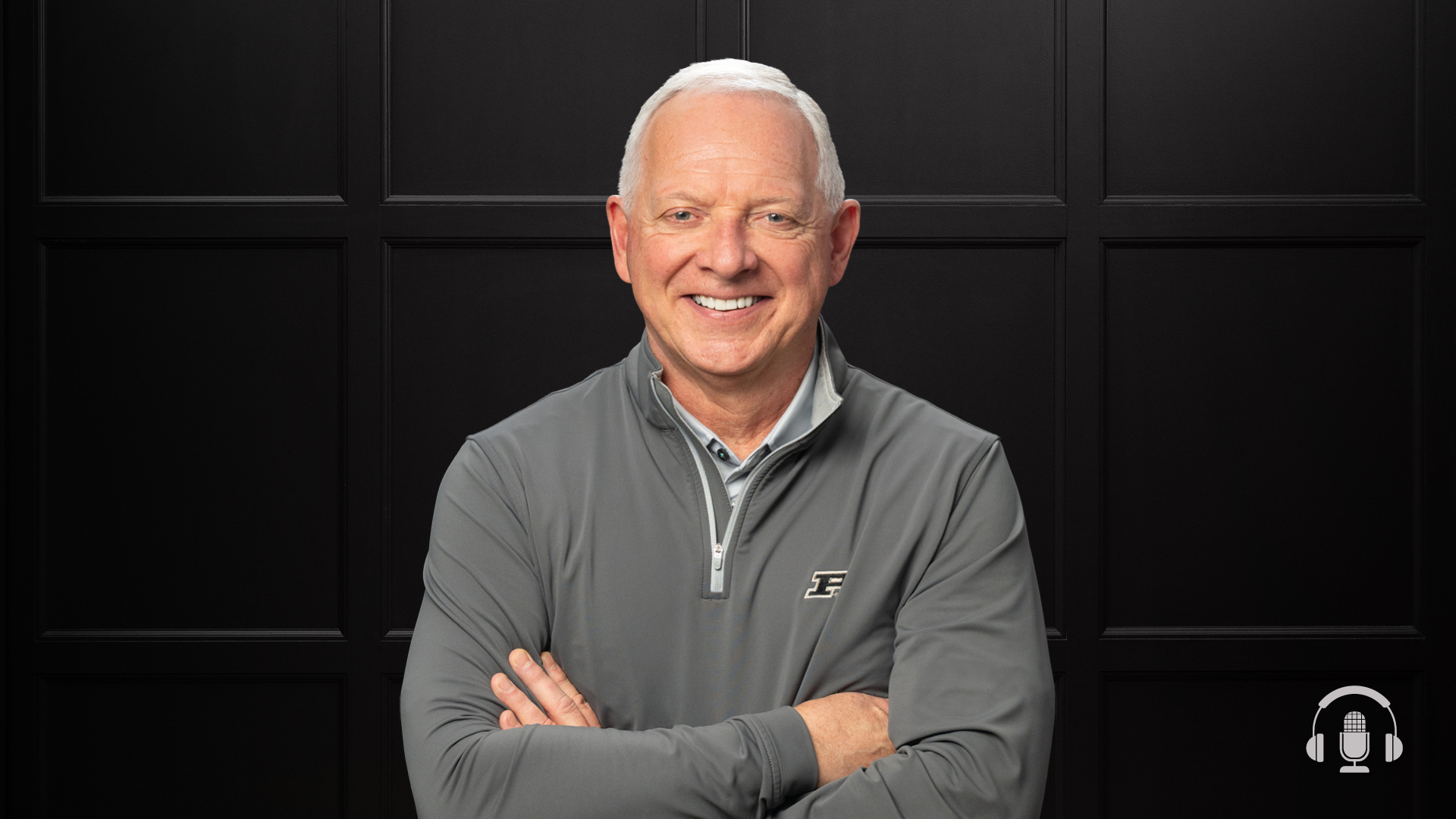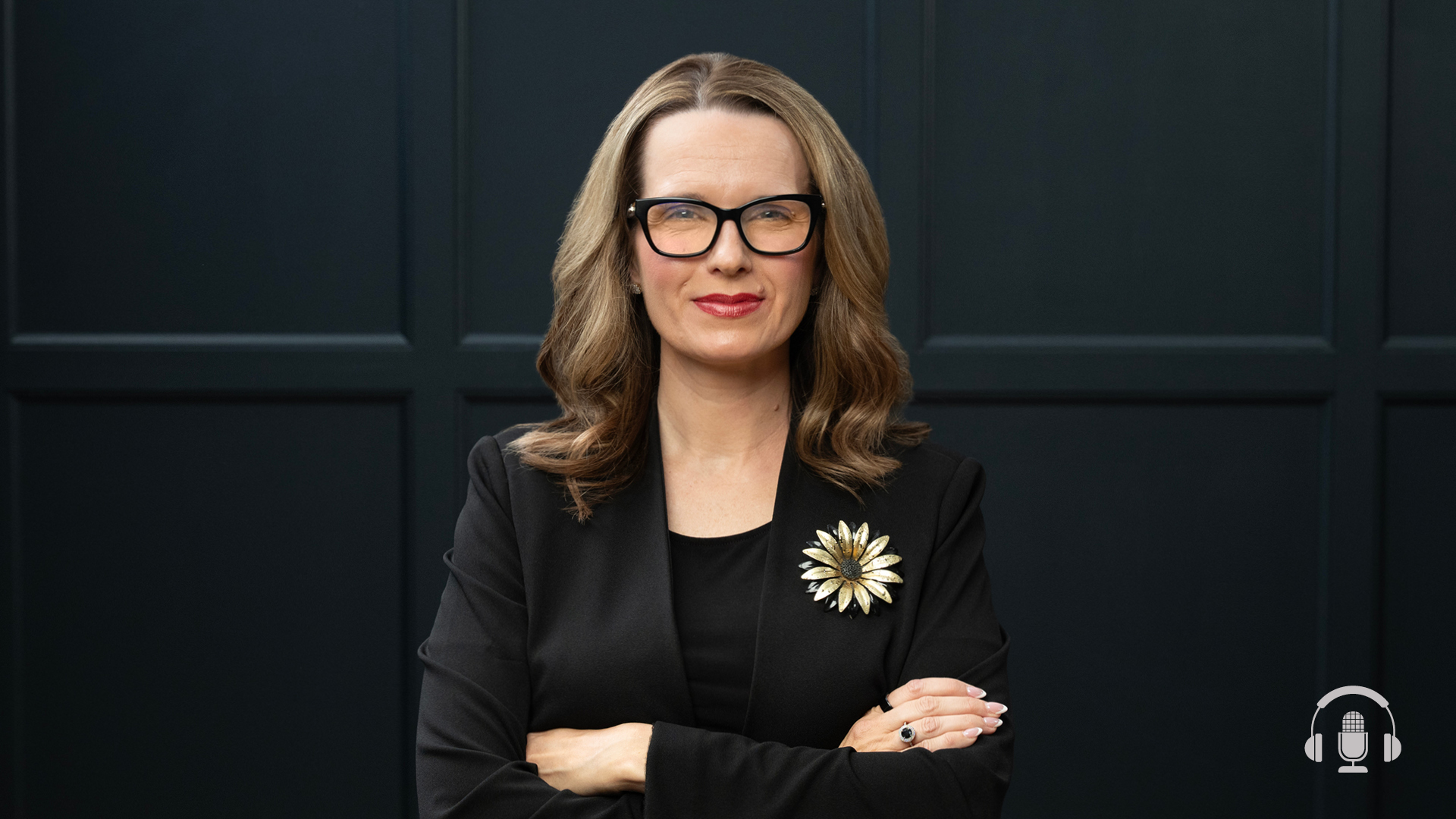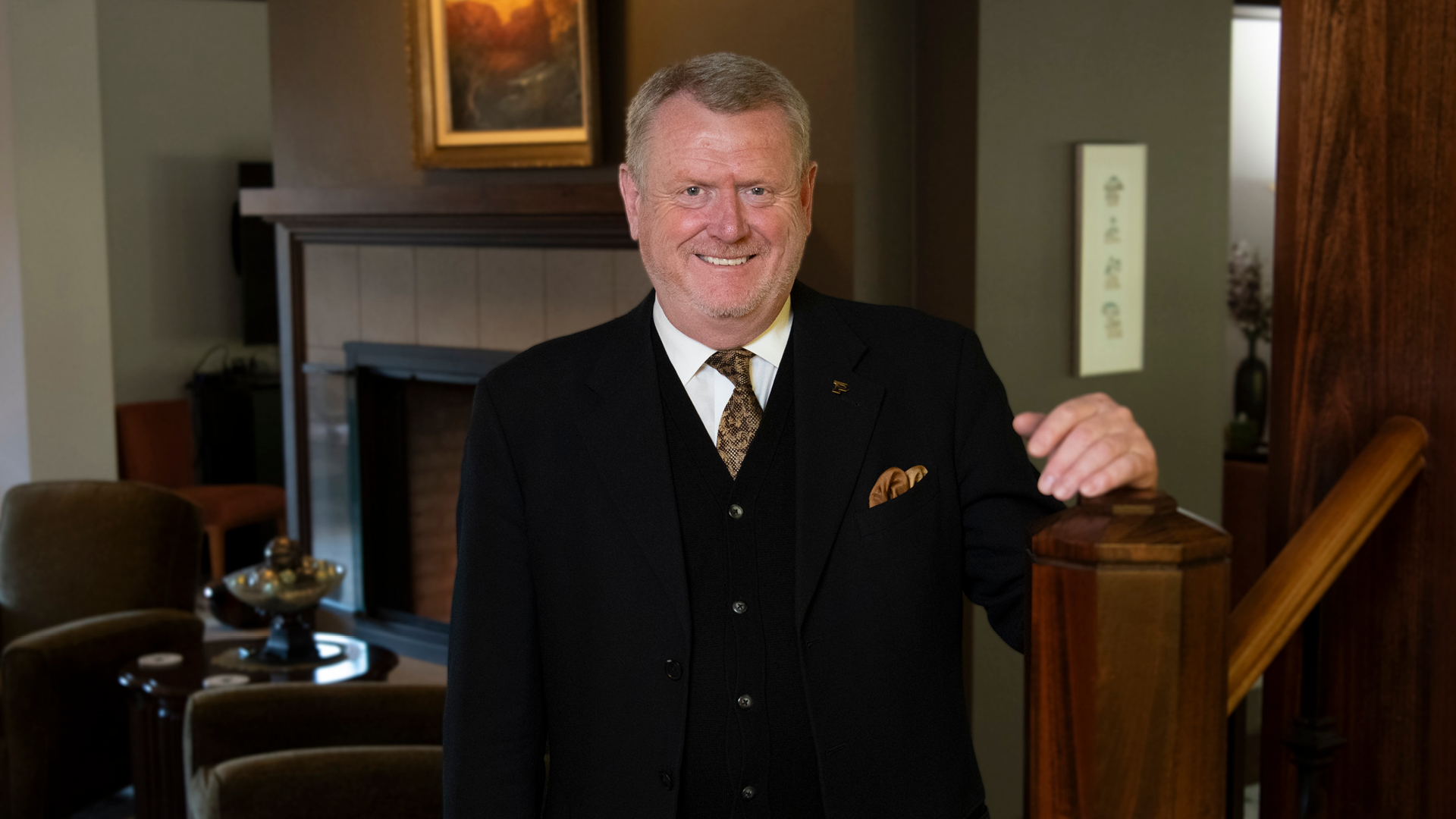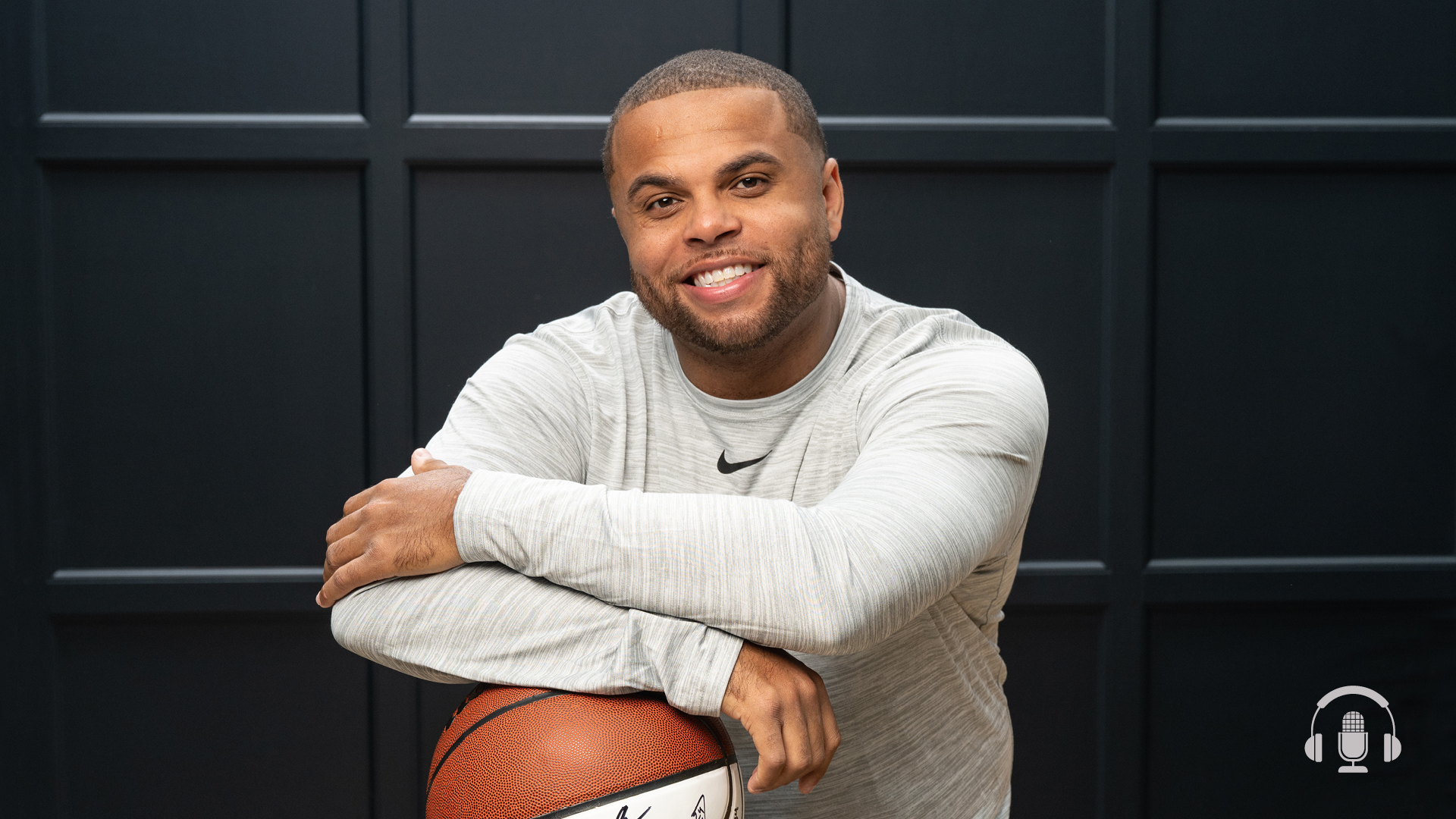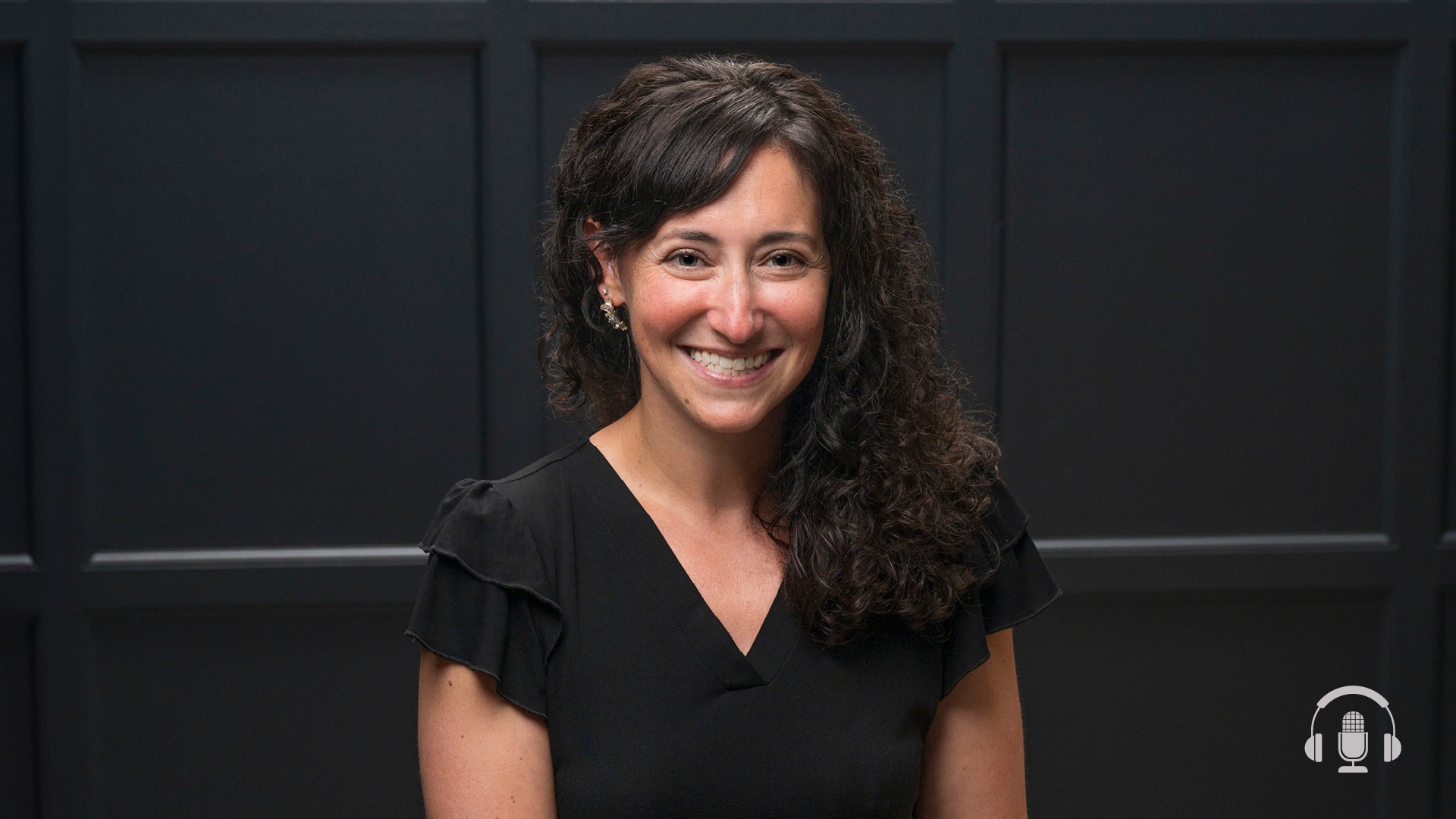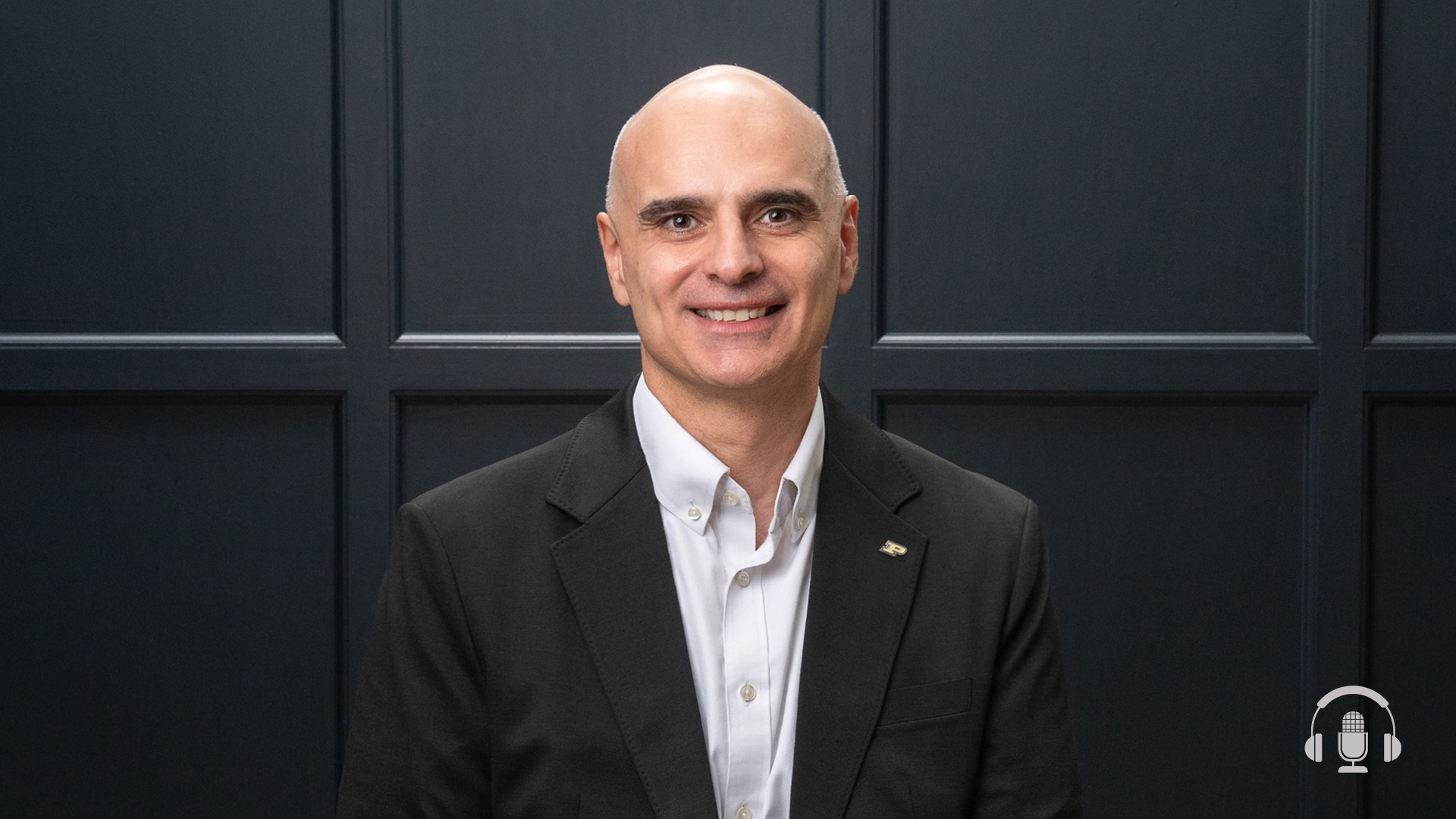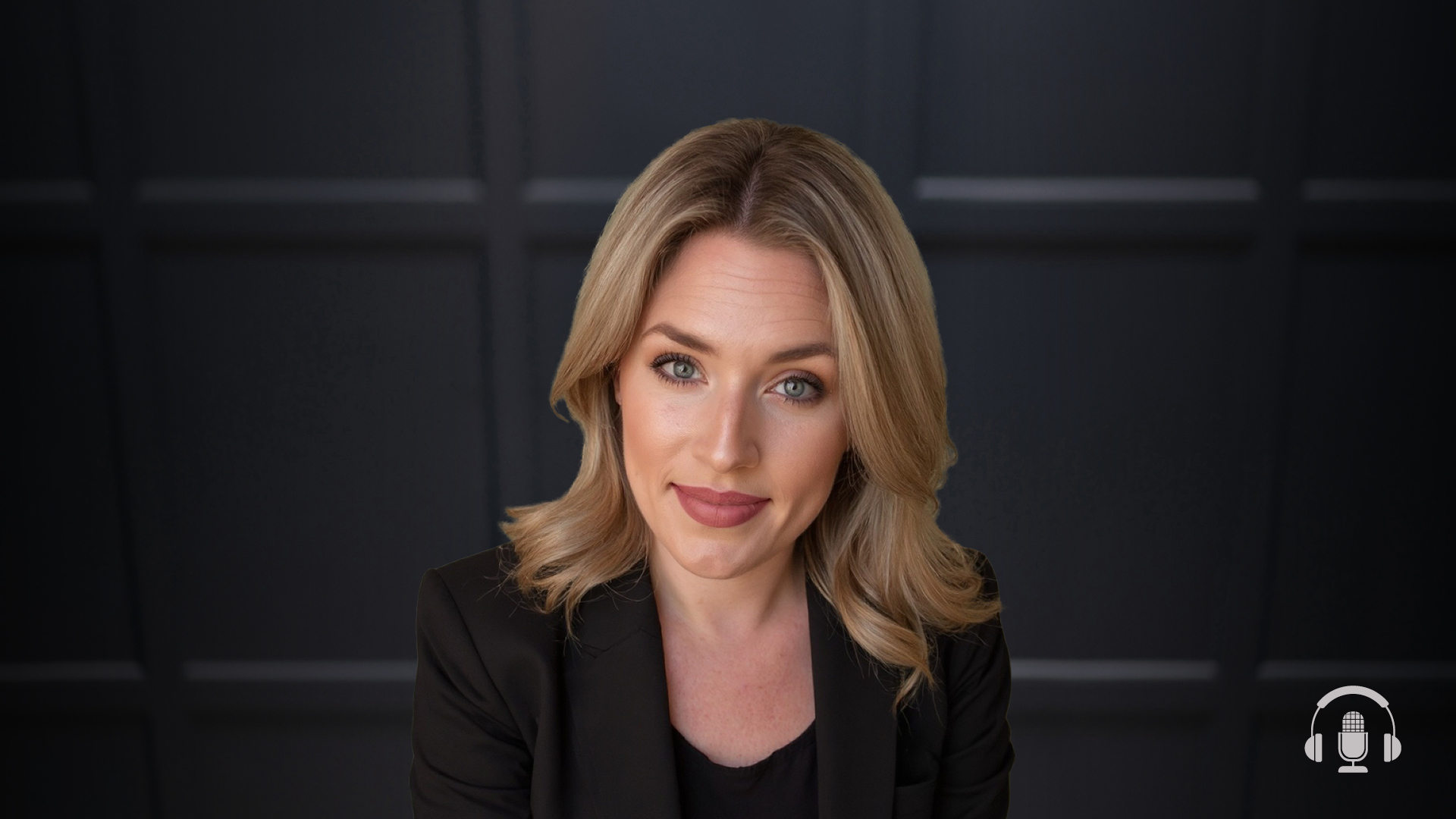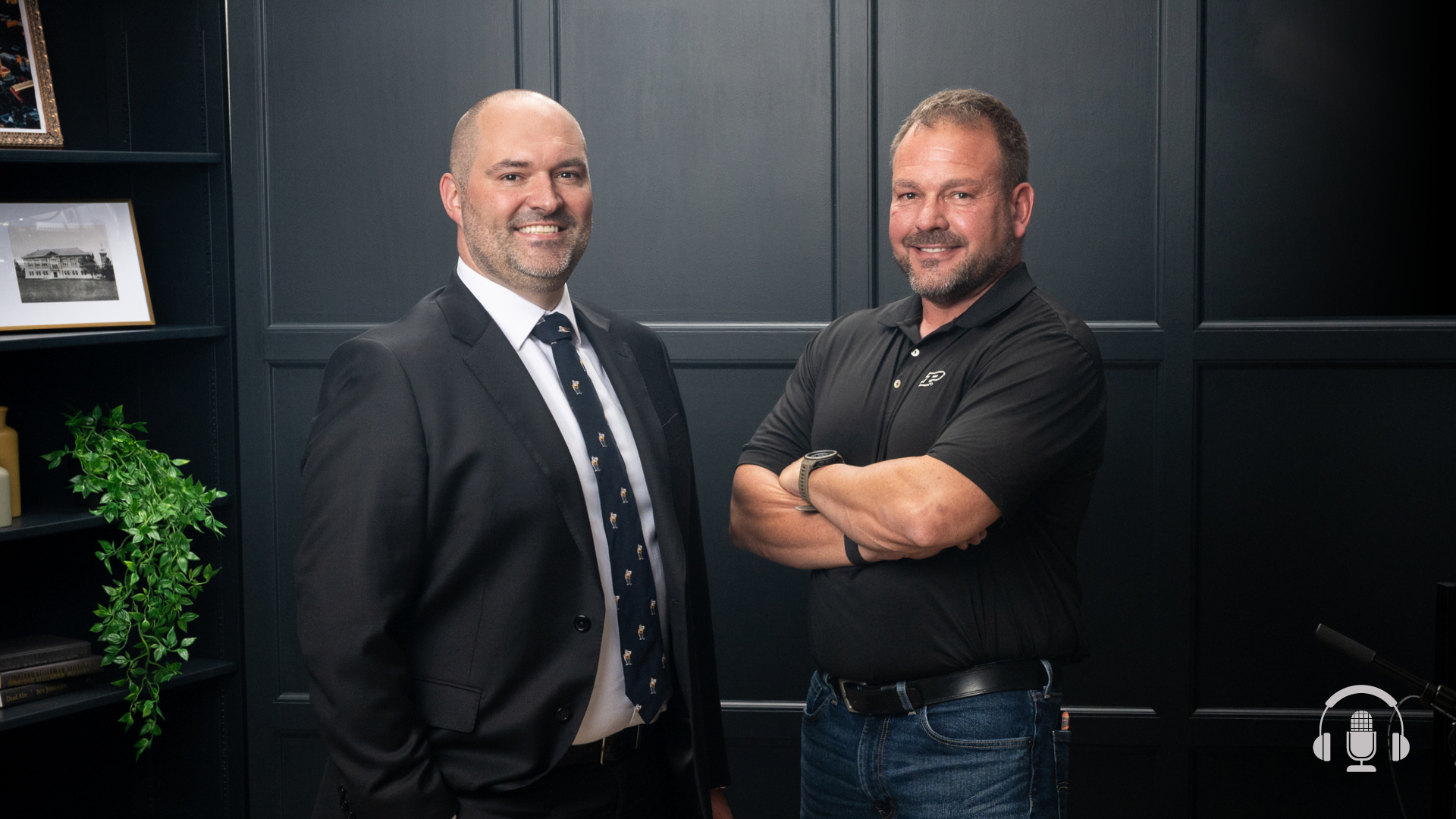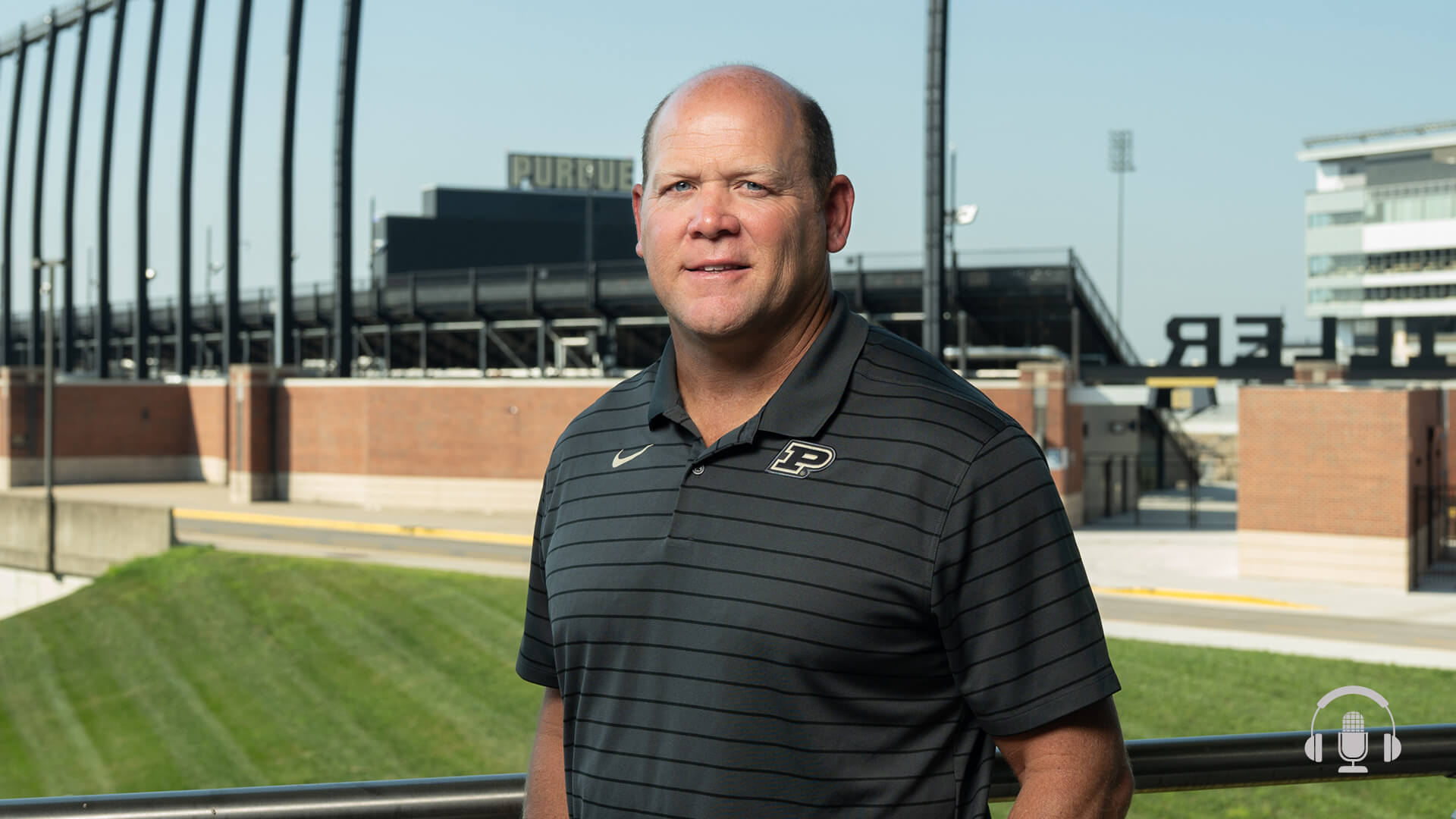Podcast Ep. 130: Purdue Daniels School of Business Professor and Bestselling Author Cara Putman on Leadership, Guiding Students and Ethics
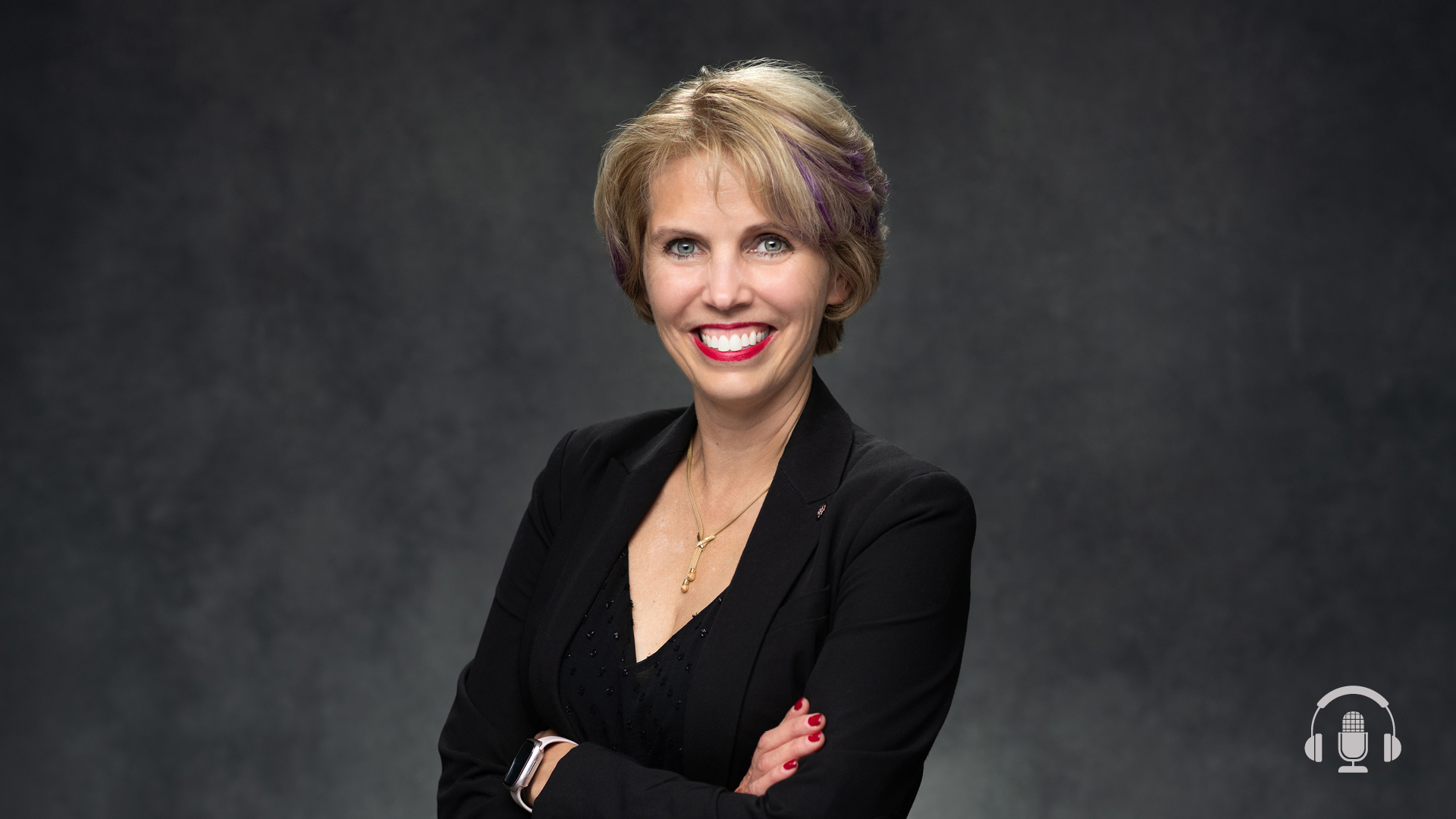
In this episode of “This Is Purdue,” we’re talking to Cara Putman, clinical associate professor at Purdue University and director of the Daniels School of Business’ Brock-Wilson Center for Women in Business.
Cara is a visionary Boilermaker and leader in many fields — she graduated from college at 20 years old, earned a JD and MBA, and is an award-winning author. She’s called Purdue home for over 20 years and has dedicated her life to being an educator and mentor to hundreds of students at the Daniels School.
In this episode, you will:
- Hear about Cara’s education journey from her hometown of North Platte, Nebraska, to law school to Purdue, and her successes along the way, including being a first-generation college student
- Learn what first sparked her passions for law, politics and education
- Discover how mentors inspired her to become a force for good and why she wants to do the same for students at Purdue
- Find out about the study abroad programs she’s led and business classes she’s piloted at the Daniels School, including a core ethics course for undergraduate students
- Gain insights into her incredible work at the Brock-Wilson Center, including how she’s helped grow the ambassador program from dozens to hundreds and guided students during their transition to the professional world
- Discover how she hopes the business world will evolve in the years to come and how she’s preparing Boilermakers to tackle real-world ethical challenges
- Hear about her experience as an accomplished fiction author, why she started writing as a teenager and how it helps energize her work at Purdue
You don’t want to miss this exciting episode with a Charles B. Murphy Outstanding Undergraduate Teaching Award-winning professor who’s making a global impact for Boilermakers in business!
- Learn more about Cara Putman
- Learn more about the Purdue Daniels School of Business
- Learn more about the Brock-Wilson Center for Women in Business
- Learn more about the Brock-Wilson Center Ambassadors
- Learn more about the Brock-Wilson Center’s Confident Transitions program
- Learn more about Cara’s research on integrating ethics into the classroom
- Learn more about the Murphy Award, Purdue’s highest undergrad teaching honor
- Learn more about the fiction books Cara has authored
Podcast Transcript
Cara Putman:
This is Cara Putman, and you are listening to, This is Purdue.
Kate Young:
Hi, I’m Kate Young, and you’re listening to, This is Purdue, the official podcast for Purdue University. As a Purdue alum and Indiana native, I know firsthand about the family of students and professors who are in it together, persistently pursuing and relentlessly rethinking, who are the next game changers, difference makers, ceiling breakers, innovators? Who are these Boilermakers? Join me as we feature students, faculty and alumni taking small steps towards their giant leaps and inspiring others to do the same.
Cara Putman:
I think that one of the best things that women and really, any student can do when it comes to being job ready is, figure out what your superpower is, because that will help you become more confident as you step out into the workplace. When you invest in that, you really get the opportunity to dig deep and go, this is what I bring to any team, to any employer that nobody else does.
Kate Young:
In this episode of This is Purdue, we are talking to Cara Putman, Director of the Mitch Daniels School of Business’ Brock-Wilson Center for Women in Business, Clinical Associate Professor at Purdue, and bestselling author. Cara is dynamic, she’s enthusiastic, she’s passionate. Our entire team was captivated by her stories, and I know we all learned a thing or two from her practical advice. And it was no surprise that just recently she earned a Charles B. Murphy Award, Purdue’s highest undergraduate teaching honor. Cara has called Purdue home for over 20 years, and has dedicated her life to being an educator and mentor to thousands of students over the years.
In this episode, you’ll hear more from Cara about why Purdue is a supportive place to learn, grow, and discover your purpose, how the Brock-Wilson Center for Women in Business creates empowered and confident leaders, and what she believes is the biggest ethics issue facing the business world today. Plus, she shares her secrets to finding purpose, success, and belonging, and advice for discovering your superpower in the workplace. And finally, we’ll dive into Cara’s experience as an accomplished author of more than 40 books and how her writing journey helps further energize her work at Purdue. I myself just had the pleasure of reading one of her legal thrillers and I could not put it down. All right, let’s get to it, here’s my conversation with Cara.
Cara, thank you so much for joining us on This is Purdue, the official university podcast. You’re our second guest in our new studio, we’re so excited to have you.
Cara Putman:
It is beautiful and I am delighted to be here. Thanks so much for inviting me.
Kate Young:
Of course. So you’re no stranger to podcasting?
Cara Putman:
Nope.
Kate Young:
You’re an author, you have your own podcast called Book Talk.
Cara Putman:
I do.
Kate Young:
I’m excited to talk to a fellow podcaster today.
Cara Putman:
Well, and it’s kind fun to be on this side of the microphone, although it’s also a little weird to be the one getting the questions instead of giving the questions.
Kate Young:
Sure. Well, we hope it’s a good experience for you.
Cara Putman:
So far it’s been great.
Kate Young:
So you’ve helped champion the Brock-Wilson Center for Women in Business, part of the Daniels School of Business. We are just really excited to dig into everything that you’re doing for women and Boilermakers in business, but let’s kick things off at the beginning. You had an interesting childhood and schooling experience growing up. You finished high school at age 16, you graduated from college at age 20, and you completed your law degree at 27. So, tell us a little bit of background about your schooling experiences growing up.
Cara Putman:
I was a first generation homeschooler, so that’s how I graduated from high school at 16, because I was really one of the first homeschoolers in Nebraska, which is where I’m from. And so as soon as it became legal in Nebraska, my parents were some of the first to sign up and go, “Hey, this sounds like a great way to get an education.” So, we started when I was in fifth grade and I was homeschooled from fifth to 10th grade, and then I kind of talked my way into college.
I had read an article in Homeschool Legal Defense Magazine or something like that, about young man somewhere who went to Harvard at 16. And being the person I am, I was like, well, if he can go to college at 16, I should be able to go to college at 16. And God bless my parents, they went, “Okay. Well, maybe,” but they didn’t shut it down. They were like, “Well, we’ll see if Cara is still serious about that when she gets to 16.” And essentially the moment I turned 16, I went, “Okay, are we going to go sign me up for college?” And they were like, “I don’t even know how we do this.”
But we had a community college in our town. I’m from North Platte Nebraska, which for those of you who’ve never heard of it, it’s halfway between Omaha and Denver. So, I like to say it’s in the middle of everything and absolutely close to nothing, it’s about four hours from each of those. So we had a public school, a Catholic high school, and the community college. And so the community college really became a fantastic launching pad for me, I think of it as my high school. And so I started at 16 and graduated with my associate’s degree when all of my friends were graduating with their high school diploma.
Kate Young:
So then what brought you into law school?
Cara Putman:
So it was actually the fact that I had been homeschooled, and I very vividly remember, I was 12. The teachers were trying to get the law reversed to make it illegal to homeschool. And so my mom dragged us along with a lot of other homeschool families, we’re down at the unicameral, Nebraska has a one-house legislature. And so we were down there for a day and I’ll never forget because it was a really long, really boring day, but we were sitting there for an entire day watching the legislative process in the committee room. All these people are getting up and they’re talking about why homeschooling is important and why it’s a necessary educational alternative for families, and the state senators just really aren’t engaged.
And then the attorney from homeschool legal defense sat down and it was almost night and day. All the senators sat up and they all started really paying attention. And my 12-year-old brain went, “I want my words to matter. And if it takes a law degree for my words to matter, then I think that might be what I need to get.” And that’s that pivotal moment where I started thinking about, maybe law is what I need. And I also think it’s when I started really falling in love with politics. My parents were really engaged with party politics in Nebraska, so we were always going door to door in campaign seasons.
When I was at the University of Nebraska-Lincoln, I paged at the unicameral, I interned for a state senator. So I mean, I was majoring in political science, so I was really engaged in that whole process, which really leads to law school as well. But it was kind of that one-two of watching the process and then watching the impact that an attorney had versus everybody else and I’m like, it really shouldn’t have made a difference. But for some reason that JD at the end of their name really made a difference to those state senators and I went, “I want that.”
Kate Young:
That’s incredible at age 12.
Cara Putman:
It’s like my path did a little bit of tacking side to side, but I never really deviated from, I think I want to go to law school.
Kate Young:
So, let’s talk through your Boilermaker journey. How did you get to Purdue, how did you join us here?
Cara Putman:
Funny story, I didn’t even know Purdue was a thing. There are a lot of people who will be on either coast, they’ll be all over the world. My husband and I travel, and he’s always in his Purdue gear and it doesn’t matter what airport we’re in, you’ll always hear, “Boiler up, hammer down, boiler up, hammer down.” And so, there’s such an amazing community of Boilermakers, but at the time I was at Nebraska as an undergrad, we were not in the same athletic conference like we are now. And so, I was just not really familiar with Purdue. But then I married a Boilermaker and very quickly became familiar with Purdue. And he followed me to DC where after graduation, we both worked in the DC area for a while in the nonprofit world. And I went to law school while working, clerked for a federal judge. I was headed to the Department of Justice to work in their honors program and I was really excited, it was like my dream job at the time.
And then my husband came home from work one day and he said, “I just saw this listing in the Chronicle of Higher Education for a job at Purdue for the Jischke,” what we came to find out was the Jischke Capital Campaign, and it was for the College of Ag, which is his alma mater. And I was like, “I think you’ve got to apply,” and my HR brain went, “And they would be absolutely insane not to hire you,” And that was in April. And I really started packing then, even though I knew I was headed to the Department of Justice for my dream job.
And it was August when Purdue finally got through all the hoops. And so the week I was supposed to start my dream job, we were moving to West Lafayette, a town I’d never really been to. I’d been on campus one time, I knew there was a Cracker Barrel and there was Purdue, and that was it. So I told him, I was like, “I can do anything for two years, as long as there’s a Walmart.” And that was why we came here, because I knew Indy was an hour away, Chicago was two hours away, and that was 23 years ago. So we got here and obviously fell in love with the community, and Purdue has been really good to us.
Kate Young:
And here you are today.
Cara Putman:
And here we are today.
Kate Young:
Cara digs more into both the Daniels School of Business and the Brock-Wilson Center’s efforts on recruiting young women, and what led to her passion for mentoring and leading women who are pursuing business careers.
Cara Putman:
It’s something that’s really fun to think about, because when I look back on my life, I think about the moment I stepped onto the campus at Mid-Plains Community College, as the 16-year-old who really didn’t know hardly anything. I mean, I’d been homeschooled for six years and I think about Mrs. McGann, who took me under her wing and gave me the opportunity to be the student body president and to do some different things like that. I think about … Mr. Babcock who were on the Truman Selection Committee at Mid-Plains Community College, which then I was a finalist, that then got me on track to at the university become a Truman Scholar, which then actually allowed me to go to grad school. Because this is first gen, I didn’t know how I was going to pay for all of these things.
And so every time I look back, there have been people who have poured into me and have mentored me because I didn’t have this wealth of family experience. We were entrepreneurs. My parents were very much at the time, I was navigating this whole college experience, they were helpful as much as they knew to be helpful, but they were also really focused on building our businesses. And also telling me, “Cara, you’ve got three siblings and so we don’t know how much we can help you pay for college because you’ve got three siblings coming behind you.” And so it was all these different people at Mid-Plains.
At the University of Nebraska Lincoln, there was one of my professors, the department head that I think every time he had office hours, I was in his office. Sometimes I don’t even know what we talked about. I mean, I look back now and I’m like, I am surprised he didn’t see me coming and slam the door, because he had to be like, “Oh my gosh, here comes Cara again.” And yet at the same time, if he hadn’t done that, I don’t know that I would’ve actually gotten into grad school because it was him and then the executive secretary of the Truman Foundation, who both gave me the advice of, “You are graduating at barely 20,” my birthday’s the end of March and I graduated at the beginning of May.
So I mean, I was a baby 20-year-old and they’re like, “You’re going to go to grad school. You have this scholarship, but let’s take a couple years and figure out what you really want to do.” Because I got the Truman on, I’m going to get a PhD in international relations. The Iron Curtain had just fallen and I was like, I want to be part of figuring out what’s going to happen in this power vacuum in Europe and all of this. What’s going to happen now and what are we going to do? And I look at the world today and I’m like, we still got to figure out what’s going to happen in this power vacuum and everything that’s going on. And they were like, “Maybe that’s what you’ll do, or maybe you’ll go to law school.” And I had another professor telling me, “You should really get an MBA in HR,” and none of them were wrong. I ended up with an MBA and I ended up with a law degree, but that advice to go work for a few years and figure out what you really want to do.
So I think those experiences, coming back to your question, is what really birthed this passion for mentoring today’s students. And I think it’s why I am so passionate about Purdue and what we do, because we are a land-grant university. We are all about fundamentally, if we ever lose that part of our DNA, that we are a land-grant, we should be the place for first generation students, because there are still a lot of first generation students out there. We should never lose sight of the fact that there are students who they come here, and one of the things I tell students every time I see them on tours, I’m like, “You are getting a lot of pressure today to know exactly what you’re going to do and you’re 18 years old,” some of them are 17, “And you’re going to change your mind six times.”
And I always tell mom and dad, “Cover your ears, but actually don’t, because it’s okay.” Because our advisor to student ratio, at least at Daniels, is one to 250. The national standard is one to 750. We are scaffolded to help students and to provide the tools that they need to be successful. So you don’t have to panic when your student calls you, says, “Mom, dad, guess what? I want to change my major.” You should be able to go, “It’s okay. Purdue is going to help you through that process.” And there’s people like me, there’s people like their advisors, we’re here to help. That’s what gives us our joy. All of that I think comes together to kind of fuel me to be like, how can we create more of those structures and systems and safe spaces and communities of belonging, so that every student at Purdue can absolutely thrive?
Kate Young:
And how do you guys within Daniels School of Business recruit the types of people that you want to see come through the school? Like you said, first generation, women, how do you guys do that?
Cara Putman:
It really is challenging in higher education right now, because one of the just realities of demographics right now is what we’re calling the demographic cliff. Because in general in higher education, there’s this cliff of there aren’t as many 18-year-olds today as there were five years ago or 10 years ago, and there’s going to be even fewer starting, I think it’s 2025. Oh, that’s this year, oops. And so it’s like there’s just this in general, smaller pool of 18-year-olds. And then in Indiana, we have this added demographic challenge that I really want to crack, because I’m like, don’t tell me no because if you tell me no, I’m like, we can solve it, there’s a way to fix it. But in Indiana, there’s still a lot of students who don’t think they need to go to college, period. And especially with men, which I think is just fascinating. And I think when you talk to different people, they’ll say it’s because of unions, it’s because of agriculture, but those demographics are shifting in the job market.
So I think part of what is happening with the semiconductor plants coming and AI and all these different things, we’re doing some really interesting things with the economic development job marketplace that we are going to have a different story to tell high school students, but we’ve got to bridge that divide between high school and college. And so, that’s part of what we’re actually doing at the Brock-Wilson Center and I’m so proud of it because when we go out to recruit, if we are just talking about women in business, it is such a miss. It’s a big part of it, but we are recruiting for Daniels and we are recruiting for the university, because we’re going to the DECA State Conference, we’re going to junior achievement.
I mean, we’ve got to talk to junior high and middle school students, because the decision that eighth graders are making related to math is going to be the deciding factor on whether or not they get into Purdue. Purdue is an elite university, and so if you are not calculus ready, you will not get into engineering, you will not get into science, and you will not get into Daniels, period, end of story, stop. And so, we have actually got to be talking to students and families in seventh and eighth grade because in eighth grade right now, they’ve already decided what math class they’re going to take their freshman year. But then we also have to talk to them in ninth grade when it gets hard, because their high school advisor is going to tell them, “Oh, it’s okay. Hop off the honors track. No big deal.” It’s actually a huge deal because now you have just hopped off being ready to have an application for college at Purdue, that means you’re going to get accepted. Ninth grade.
Do you think a 14 and 15-year-old is going to make the hard choice if they don’t have people at home saying, “Grid it out, sweetheart. Grid it out, young man,” because what you’re doing today is going to have a huge impact on what you’re doing tomorrow. And so we have got to be interacting with those students at a really young age. And so that’s part of what we’re doing with the Brock-Wilson Center, but we’re one little tiny unit on campus trying to make an impact and really testing some different spaces where we can go, where other organizations are already pulling together our target market, and then just kind of lend strength to what they’re already doing.
Kate Young:
Today’s business world is full of complex ethical challenges. And with all of the headlines in the recent years, Cara knew she had to take charge and prepare her Boilermaker students to navigate these challenges with practical hands-on advice. So in 2024, Cara piloted a core ethics course for Daniels School of Business students. Cara discusses this class and why it’s fundamental for students to be knowledgeable about ethics in the business world.
Cara Putman:
Ethics is one of those things that all you have to do is look at the Wall Street Journal, Financial Times, any broadcast of your choice to see that people still struggle to make good choices on a day-to-day basis. Think about if you have kids, what’s one of the things we’re always telling them? “Make good choices.” I tell my son all the time, our youngest, I’m like, “Use your powers for good.” We’re always telling our kids that, but there seems to be a disconnect between when they’re kids to when they become professionals.
And so about 2018, 2019, I became the principal investigator with a group of faculty, and it’s not all just in Daniels, we’ve got a few from Polytech, that we are studying, how can we more effectively teach ethics at the undergraduate level? The Blake Family Ethics Center is an outgrowth in part of that work. What we are doing in this one credit course is kind of that foundation, but we’ve developed a four-year model that we hope will at the end of it, when students have spent four years with us, when they leave, they will have a toolkit but they will also have practiced, because I think that’s important. And we think the research shows that, that the more interactions you have with ethics, the more times you have to practice ethics, the more times you have to pre-think, what would I do when I am confronted with those tough choices? Not that you will do it perfectly every time, but you will be better prepared to then make that hard choice, because life is filled with choices.
And the other thing we’re trying to do is remove ethics from being over here. So when we make decisions in a business context, most people will tell you there’s a people decision, there’s a finance decision, there’s a supply chain decision, there’s all these different things, and then ethics is over here in a corner. And it really, it should just be another part of this decision-making process. So we’re trying to help people to see it’s just integrated in instead of being the afterthought. And so that’s really what we are trying to do with this modeling.
And so we’ve been able to take it, I’ve presented it internationally at conferences, nationally, so we’re trying to get a lot of feedback on it and get thoughts. We’re starting to write it up and put it, disseminate it in different journals and things like that, because another one, I guess my foundational philosophies is, if we’re doing something and we really believe it’s excellent, then we should be opening it up for other people to challenge us on it, but also to disseminate it in a way that other people can replicate it
Kate Young:
Can use it.
Cara Putman:
Yeah.
Kate Young:
What do you think the biggest ethics challenges are right now today in the business world?
Cara Putman:
I think it really comes down to being willing to walk away. I’m a big believer in giving people practical tools, and this is going to sound so simple, but one of the things I am constantly telling my students, and they’ll even tell you, practical tips of Putman, is you need a six months emergency fund. So that if you’re asked to do something that’s illegal or unethical, you can walk away, because often people don’t leave even when they know they should because they don’t feel like they can leave.
And so if we are helping students to pre-think, okay, these are my non-negotiable, so we’re asking first year students in that class to write down, these are my non-negotiable values. And I even tell them, I’m like, “Unless I can see that this value could lead you to jail, I might not agree with you but I’m not going to tell you you’re wrong. Unless I’m like, I think this one could actually lead you to jail, then I might ask you to reconsider it. You can write what you want, I just want you to know your why, because you have to know why it’s something that’s really important to you or it’s not going to actually help you make choices.” I would love in three years to have them rewrite it and see if it changes, see if there’s any movement in it. This is our first year of the longitudinal, so maybe we’ll be able to do that, maybe not, we’ll see.
But then we’re also giving them other tools, like really quick okay, here are three questions that walk you through three of the big philosophical ideas and giving them lots of things. But I think seriously, one of the most practical is, have a six-month emergency fund. So you can literally walk away. Because often, like WorldCom, two of the people who went to jail knew what they were doing was wrong. They wrote letters of resignation, but they didn’t submit them because they thought they didn’t have a choice.
Kate Young:
Because they didn’t have the savings, or at least in their mind, they wanted to keep making money and not walk away from it.
Cara Putman:
Because the WorldCom’s headquarters was in a small town, smallish town, 20,000 people in Mississippi, and they were both the primary breadwinner in their family. I don’t want our students to be in that situation.
Kate Young:
That’s a great, great idea. What was it, practical tips with Putman?
Cara Putman:
Yeah, practical tips with Putman.
Kate Young:
That’s a perfect tagline.
With your law background, plenty of cases, you teach students about plenty of court cases that have affected women specifically in the workplace. Why are you passionate about sharing these cases with your students?
Cara Putman:
I think it’s really important for students to understand the context of where we’ve been. And so understanding work cases is one way to do that.
So another meeting I had was related to study abroad program that I’m taking students on this summer in Prague, and one of the things we were talking about was Czech Republic, Prague, it has been this crossroads of so much of history and so much that has happened that I don’t think our students understand. They don’t understand it was behind the Iron Wall, they don’t understand that the Nazis overtook the country during World War II. So it was helping them to see that, like taking them to a bomb shelter that was in place during the time that it was behind the Iron Curtain actually is not a bad cultural trip, especially in the context of what’s happening in the world today. And so helping students to understand where we’ve come from and where that might help us see where we’re going, or help us avoid certain things, that’s actually a part of what education is.
And so, one of the things that I do appreciate about teaching at Purdue is the fact that we followed the Chicago principles. So I’m always in the first day or two of class level setting with students, that one of the things that’s absolutely fundamental. You don’t have to agree with me on everything, and in fact, you shouldn’t. I don’t want to create a bunch of mini Cara’s, that would be an absolutely terrifying world. We don’t need that, but we do have to respect each other. We do have to have civility, because I teach law and ethics, you’re not going to agree with me. You’re not. But if we can’t actually have the conversations, the world is a really scary place, because groupthink is actually not a good thing.
I have to in ethics, I have to talk about confirmation bias. I have to talk about framing bias. I have to talk about overconfidence bias. I have to, I have to. If students aren’t willing to go with me there, the class isn’t going to work and I’m not going to be able to do my job. But that means I have to respect them and they have to actively feel that respect from me, and then they have to respect me back. It’s this really interesting two-way street. And with the ethics class, they’re first year students. And so it’s been really challenging in some ways to be able to real quickly in an eight week class, establish that and build that rapport, and get to the place where I’m like, no, I’m serious about this. I really do want to have these conversations. And if I’m playing devil’s advocate, it doesn’t mean I don’t like you or I’m not agreeing with you, but we have to have this full enriched discussion so that we can actually get into, well, what does this look like?
And guess what? Not everybody’s going to agree with you in real life, so you have to learn how to handle this. It can be a challenge, but it’s so important in this world today to know how to have those conversations and actually be able to do it and do it well.
Kate Young:
And be able to exist with other people who may not have your same beliefs and have that respect still.
Cara Putman:
Absolutely, we need that. If I just stay with people who only think like I do, my life is very narrow and I am missing out on the richness and diversity of experience. And if people who don’t think like I do are doing the same thing, there’s so much richness in the middle, but there’s also a lot of danger because we’re not seeing all the opportunities and we’re going to miss a lot of answers to problems because we’re just so entrenched in our spaces. And so we’re not going to solve the most challenging, pressing problems that our world is facing today.
Kate Young:
As the Director of the Brock-Wilson Center for Women in Business, Cara has seen expansive growth in the center itself and many of the programs within it, including the Women in Business Learning Community and the Confident Transitions Pathway. She shares more about this growth and why these resources for Boilermaker students are so unique.
Cara Putman:
It has just been so exciting because of the transformation that we’re seeing in students’ lives. If it’s just a numbers game, then it’s really, it can be a waste of resources, but when you see the impact it has on students, and numbers is a part of that story.
So when I stepped into this role in August of 2021, it’s been three and a half years. For example, there’s an ambassador program, so it was called Ambassadors, I haven’t changed the name. There were six students who were ambassadors when I came in. Those are students who want to be part of the Brock-Wilson Center, and they help us with recruiting, but then they also help us create community for the students who are in Daniels and do programming. That program went from 10, well, six to 10, to 35, to 80, and now this year it’s 205. So it’s like this hockey stick. When it went from 10 to 35, it was like, oh, that’s really good. And then it went to 85 and it was like, oh my goodness, that’s great. I mean, more than doubling, and how do you keep that community, that belonging, that we’re all here supporting each other? And then it grew to 205, but that’s basically 15 to 18% of the women at Daniels are ambassadors.
Kate Young:
Wow.
Cara Putman:
That’s pretty cool.
Kate Young:
Yeah.
Cara Putman:
And then our learning community is for first year women and they take classes together and they’ve got similar communities and science and technology and engineering. We’ve got a mentoring program. They take classes together, they do professional development. We take them to the career fair so they can get the overwhelm out of the way when they’re not really looking for a job, but then their sophomore year, they know what to expect. We do Friendsgiving and Galentine, so there’s fun activities, we take them to Exploration Acres. So, just all these really cool things so the moment they step onto campus, we are there at the residence hall to meet them so that they have community immediately. It went from 10 to last year, this year we had to beg for more spaces so we could have 40, and we’re begging for more spaces so we can have 50 next year. And we just won Learning Community of the Year and Signature Event of the year.
Kate Young:
Wow, congratulations.
Cara Putman:
So I was like, yay, we’re doing something right. And so it’s just been fun. I look around, I’m like, okay, what are we doing? What’s already existing? And then how can we, if it’s excellent, how do we scale it? How do we make it more impactful? And if it’s excellent, how do we invite more people to it? Why should people go to Harvard? They should come to Purdue.
Kate Young:
I love that.
Cara Putman:
Mic drop.
Kate Young:
That’s incredible. So in the fall of 2024, women made up 36% of the Daniels School of Business class, which is an uptick from 32% in 2022 and 2023. This increase might not seem like a big deal to people outside.
Cara Putman:
Big deal, yeah.
Kate Young:
Tell us about that. What obstacles do you believe that women still face in business today as well?
Cara Putman:
If you don’t live in the recruiting space, you could go, “Oh my gosh, that sounds terrible,” but if you look at the broader landscape, if you do benchmarking against other big 10 schools or business schools in general, it’s actually pretty shocking that that 32 to 36%, it’s kind of the standard. Wharton and maybe one or two other schools, Rutgers actually, has about 50% women, which I still am trying to wrap my mind around it. I think it might be because it’s an urban, more of a commuter type of school, but I haven’t really been able to figure out what the secret sauce is for Rutgers. But Wharton has 50% women at the undergraduate level. And then it really is this 32, 36, every once in a while you’ll get someone at 40%.
And so my best guess is, when you get women who are good in math and science, what are they told? “Go into engineering. You should be a doctor.” And that’s fabulous if that’s what you want to be, but there are a lot of young women who don’t want to be engineers and they don’t like blood.
Kate Young:
They don’t want to be in healthcare.
Cara Putman:
Hello? That was me. I’m like, ugh, I went to law school because I don’t want to do blood. And so, part of what we are trying to do at the Brock-Wilson Center is just help people, young women in particular, but really all students, to understand that there are some fabulous opportunities in business if you are really good at math. And if you’re good at math and science, Purdue is the place for you because we’ve got integrated business and engineering. And that is a phenomenal degree for people who are like, “I really like science, but I don’t know that I want to do full on engineering because IBE is first year engineering and then three years of business with some engineering woven in. And we’re looking at other degrees like that where it’s going to be this incredible blend, and that’s something that you get at Purdue that you cannot get at any other school. I mean, we really are the crossroads of technology and business. That is something that we really need to be trumpeting from every rooftop and getting the message out.
But what happens is when you have 32, 35, 36% women is, especially as you get into higher division courses, it is not unusual for our women students to realize, I am one or two or three in my class. And so what has been happening is we’ve had these clubs start cropping up, women in consulting, women in econ, women in just all these different, women in law. And so really coming around them and saying okay, first off, do you really need a separate club? And then if so, how do we support you so you get that… Because what they’re signaling is, we need community, we need a place where we can belong. And to me, what belonging is, is it’s just, I don’t have to pretend. I can just be myself. I have a place where people are glad to see me and I can just be myself.
Kate Young:
You’re full of advice, you’re full of practical tips, as we’ve heard. What is your single biggest piece of advice for women in business when it comes to networking, mentoring, and being kind of job ready after graduation?
Cara Putman:
I think that one of the best things that women and really any student can do when it comes to being job ready is, figure out what your superpower is because that will help you become more confident as you step out into the workplace. It’s one of the reasons I created Confident Transitions for our students. And I think when you’re at Purdue, again, you have this low-hanging fruit that’s available to you, because Purdue is already invested in Gallup Strengths, and so you already know what your five superpowers are. The question is, are you going to invest beyond taking that survey, that assessment when you’re onboarding as a first-year student? When you invest in that, you really get the opportunity to dig deep and go, “This is what I bring to any team, to any employer that nobody else does,” and that combination of the top five, when you put it all together, it’s like 33 million to one that anybody else is going to have that same unique combination.
Second, I’m an activator, achiever, input, maximizer, strategic. So I see possibilities where nobody else does, and I automatically see five ways to make it happen. I’m going to make it happen because I’m an activator and I’m an achiever, and because I’m input and I’m constantly taking in information, when it’s time to do it, I already have the information there and I can connect it and I can get it done. And so, I’m a unicorn in higher education when you put all that together. It’s really great because I can then walk into a room and I can be like, “Okay, here’s where I add value. Here’s where I get joy. And when you put that all together, I’m pretty much a passion explosion,” and it’s really fun. The earlier you can figure that out and start going, “Okay, I’m going to do this and I like this,” and then be ready to experiment and be ready to fail fast, because the faster you fail, the faster you can get onto the next thing.
And so college is that safe place to fail, because you’re not failing on a $10 million account or $100 million account, you’re failing on an event that yeah, it might be embarrassing, but it’s not the end of the world. You’re not going to lose your job most of the time and if you do, it’s an appointment in a student club, move on. It’s not the end of the world. Find that thing that you do that nobody else does, and be willing to try things because the cost of failure is so low in college and it’s so much lower to do it here.
Kate Young:
I love that. Find your superpower. Cara’s advice there had, thinking about what my superpower is, and I hope you all can reflect on yours, because everyone has one. So how has Cara seen all of these robust Purdue resources impact young Boilermakers firsthand?
Cara Putman:
Young Boilermakers at Purdue have so much available to them through alumni connections, through our amazing connections with donors who just pour their resources into… Even just thinking about study abroad, there are so many study abroad scholarships. I mean, my one regret from undergrad is I didn’t go. And I think that’s why I’m so passionate about taking students on study abroad, and there are resources to help them do that. And that’s just one example.
Undergraduate research, there are resources to help students do undergraduate research and so many great opportunities. And so it’s really just helping students make the connections, and sometimes they just don’t know where to go and what those resources are. And sometimes it’s helping faculty make those connections, and that’s fun too, being kind of that… If you’ve ever read Malcolm Gladwell’s Tipping Point, he talks about there’s the early adopters and there’s the connectors, and then I forget what the others are. I am not an early adopter because I am an attorney, I’m risk averse. I want to make sure it works before I jump head in. But then once it does, I’m like, I am all in.
And I love connecting people. I don’t silo. And so I love when I could be like, “Oh, you want to do that? Well, here are the people you need to connect with.” And being networked across campus or being networked off of campus, so I could be like, you’ve got a great idea and you’ve got a great idea, but you don’t know each other. And so if we can get you together, it’s going to be amazing for our students and for you. And when it works across the river, how much better because now we’re getting off of campus. I get goosebumps, it’s so cool.
Kate Young:
Absolutely. I want to go back because at the beginning of this, I mentioned you’re a very successful author, you’ve written over 40 books. You also have a podcast called Book Talk. So, tell us about the types of books you write. We have some, if you’re watching on YouTube, we have some placed throughout our set here, but I’m really excited to hear more about your writing in your books.
Cara Putman:
I am editing book 43 and 44 right now.
Kate Young:
Oh my goodness.
Cara Putman:
And book 42 comes out in April. So by the time this is out, it will have been in bookstores for a month. But I write primarily books centered around either World War II history, finding those kind of unknown stories and bringing them to light, or tapping into my legal knowledge of writing legal suspense or romantic suspense.
Kate Young:
Amazing. So, tell us about this passion for writing. You’ve had such an interesting career path, education path. Where did this passion for writing and becoming an author come from?
Cara Putman:
I have had it literally since I was about 13 or 14, and it came from being kind of that hubris of the young. My favorite authors weren’t writing fast enough, and I went, well, if they can’t write faster, I guess I’ll just have to write my own books. And then I started college and got married, but the passion for writing just never went away.
So when my husband was working on a master’s degree and we had two young kids, so they were going to bed at 8:00 and he was starting to study, I was like, well, I guess now’s a good time to try writing. And I was really fortunate. A lot of people, when they start writing, it’ll be 6, 7, 8, 9 years before they get a contract, and my journey was a year. And then my first book came out and a year later it won a major award, and I’ve been writing two or three books a year ever since. So to have 43, 44 books, and I started writing in 2005. So in 20 years, it’s pretty incredible. I’m very blessed.
Kate Young:
How do you think that that helps you, this journey of being an author and enjoying the writing process? I can tell you’re passionate about it, helps you with everything that you do with Purdue?
Cara Putman:
I think it’s this interesting balance because when I started writing, I was a lawyer by day and a writer by night, and it was that balance of left brain and right brain. And so with the teaching, it’s still a lot of, I get to do the left brain of, okay, how do I get all these concepts across to students? And then the teaching itself can be the right brain, how do you present it? And then the writing is right brain, creating and all that, and then the editing’s very left brain. And so it was just this, I guess I’m ambidextrous when it comes to, I really like to use both sides of the brain and I miss it when I’m not writing because I’m like, I really just wanted to have one book. I want to be able to say I’d written a book and gotten it published. And now I’m like, okay, so I’ve got this idea for the next series and I’ve got to get it put together so my agent can send it out to publishers. And every time I’m like, do I want to do this again?
And now of course with the Purdue Book campaign, they’re like, now we want you to write nonfiction. I’m like, do I want to do that? Because it’s very different to do academic writing and the fiction, but it just feeds a different part of me, so I love it.
Kate Young:
That’s amazing. So many people dream of writing a book. We were talking before this, some of the girls, and they’re like, “It’s on my bucket list to become a writer.” What advice would you give to young writers or really any writer who wants to get published?
Cara Putman:
Yeah, I love teaching at writing conferences and helping people have their writing dreams come to life, because studies out there that say something like 85 or 90% of people say they want to be a writer. And some of the best advice I can give is, number one, you have to be a reader because if you want to write, you have to know what makes a good book. And one of the best ways to do that is just to read voraciously, particularly in the genre you think you want to write. But I also think it’s good to kind of read across because you can pull in techniques that work well from other genres.
And then the other is, you have to put your butt in a chair and you have to actually write. And so if you write 500 words a day, which is about two double spaced pages, over the course of a year, you’ll get to roughly 100,000 word book. Two pages a day, it’s not that much. Break it up into small chunks. Once you know what you’re doing, it’s about 20 minutes. Take part of your lunch, stop binging a show. I gave up watching TV when I started writing. So there are a lot of TV shows that people will talk about that I have no idea what they’re talking about. I had to give something up to make space for writing. I am catching up on a few shows now. I did watch the first season of Only Murders in the Building, and we’re watching High Potential right now.
Kate Young:
I love High Potential!
Cara Putman:
I know, it reminds me of Castle. I’m like, I kind of like the energy behind it because you can learn a lot from really good TV shows or all the Marvel movies, I love that. Well, now they’re going downhill, but there’s so much on character development from the Iron Man one through Endgame. There’s so much you can learn about character development and things like that. But even then, my family was like, “Seriously, can’t you just watch a movie?” I’m like, no. I am studying for character and all this kind of stuff, but figure out what you’re going to give up so that you can make space to write two pages, a day.
Kate Young:
Stop scrolling on social.
Cara Putman:
Yes, exactly.
Kate Young:
Stop watching Netflix.
Cara Putman:
Instagram. Do you really need Instagram or whatever it is, TikTok? You can find the time.
Kate Young:
I love that. So I want to bring us back to Purdue and the Daniels School of Business. What do you envision DSV to look like in five years?
Cara Putman:
Well, in five years we will have our new building, and that will be amazing because it’s student facing. The Brock-Wilson Center will be on the fourth floor, very excited about that. We will probably have 4,000 to 4,500 undergraduate students. They will be and continue to be some of the top business students in the country that I will love teaching. And I think what we will see is we will probably have a couple new majors. There will be a class, at least one class on artificial intelligence. That one’s rolling out in the fall. Hopefully we’ll have a law major, we’re working on that.
What you’ll see is that the faculty and the students will really be engaged on the question of, how does business connect with technology? And I’m really excited to see what we can do with having access to Indy in the new way. I think that there’s opportunities for engagement with all of the great companies in Indianapolis that when it comes to opportunities for students to really get in there and apply what they’re learning in the classroom to real world problems. In a way that, not that we couldn’t do it here, but actually getting to go to the company and see the systems and see the processes, like a living lab. I think that having the Indy campus will allow us to do some things like that in new and fresh ways.
Kate Young:
What about the future of the business world in five years, what do you hope to see?
Cara Putman:
I would love to see, you’re putting on my ethics hat. I would love to see a world where there aren’t so many scandals, where the business leaders really are thinking about shareholders and employees, and thinking about the long-term impacts of their decisions in a way that balances those interests. You can create shareholder value without having to sacrifice treating people well.
Kate Young:
That’s perfect advice. Well, we can’t thank you enough for joining us.
Cara Putman:
Yeah, thanks so much.
Kate Young:
Is there anything else that you would like to share with our listeners? Anything I missed?
Cara Putman:
This has been so much fun. Thank you for having me today, and Purdue is just such a great place to be. I’ve been really, really blessed to be here for all these years, and boiler up.
Kate Young:
We can’t thank Cara enough for joining us on on This is Purdue. You can watch more behind-the-scenes videos with Cara, including her advice for upcoming graduates, and more details about her favorite characters from her award-winning books. Check out our podcast YouTube channel, youtube.com/@ThisisPurdue. And of course, be sure to follow This is Purdue on Apple Podcasts, Spotify, iHeartRadio, or wherever you get your podcasts.
This is Purdue is hosted and written by me, Kate Young. Our podcast videography for this episode was led by Ted Schellenberger, Jon Garcia, Thad Boone, and Zach Mogensen. Our social media marketing is led by Maria Welch. Our podcast distribution strategy is led by Carly Eastman. Our podcast design is led by Cheryl Glotzbach. Our podcast photography is led by John Underwood. Our podcast team Project Manager is Rain Gu. Our podcast YouTube promotions is managed by Megan Hoskins. Additional writing and research assistance is led by Sophie Ritz and Ashvini Malshe. Our creative production assistant is Dalani Young. And our This is Purdue. intern is Caroline Keim.
Thanks for listening to This is Purdue. For more information on this episode, visit our website at purdue.edu/podcast. From there, you can head over to your favorite podcast app to subscribe. And don’t forget, you can also check out all of our podcast content on our podcast YouTube page, youtube.com/@ThisisPurdue. And as always, boiler up.
